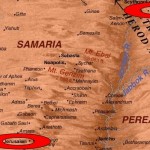Pella
 Pella was the city of refuge for the Christians during the destruction of Jerusalem. The Jerusalem Christians were convinced that the end of the world was coming so could not care less about politics and saving Jerusalem. Jesus had warned of these very things and they were told to flee when they saw them happening. The faithful left the city and established themselves in pagan and pro-Roman Pella, on the farther bank of the Jordan.
Pella was the city of refuge for the Christians during the destruction of Jerusalem. The Jerusalem Christians were convinced that the end of the world was coming so could not care less about politics and saving Jerusalem. Jesus had warned of these very things and they were told to flee when they saw them happening. The faithful left the city and established themselves in pagan and pro-Roman Pella, on the farther bank of the Jordan.
The flight of the Judean Christians to Pella on the outbreak of the war with Rome in AD 65 marks the final severance. From that hour Judaism and Christianity parted. The Jews accused the Christians of treason and cowardice, and the Christians hailed the destruction of the Temple by Titus as a fulfilment of Jesus’ prophecy. Mutual hatred enflamed the two faiths, and some of their most pious literature was written at this time.
Crossing the Jordan, they made their way as a body to Pella, a city of Perea, which was largely Gentile and lay outside the theater of war. Eusebius records that they left Jerusalem in response to a divine revelation, and the report doubtless represents their own belief. When Jerusalem was surrounded, the Christians were to think of their safety, and seize the first opportunity for flight. Jesus had warned them to flee into the mountains. Josephus tells us that all who believed Christ, left Jerusalem in this hurry, and went to Pella and other places beyond Jordan.
We read nowhere that a single one of them perished in the destruction of Jerusalem. For Pella was only a temporary asylum, not a permanent home, and doubtless the Christians there still thought of themselves as constituting the Mother Church, the church of Jerusalem. They left in obedience to the command given by revelation to “approved men.” How long the Christians of Jerusalem remained in Pella we do not know. Epiphanius reports that they returned to Jerusalem some time after the destruction of the city. But we have no information that Jerusalem was anything more than a Roman garrison during the interval, and the report is probably a mistake.
At the same time Symeon suffered martyrdom under Atticus, who was governor of Judea under Trajan, and hence it may be assumed that the Christian community of which he was the head had returned to Judea before that time. The Nazarenes, as a distinctive sect, were the Jewish Christians who did not remove from Pella when as tradition holds, the fugitive church of Jerusalem returned to Aelia Capitolina, which no Jew was allowed to enter. But they existed much earlier, and are to be regarded less as deliberate heretics than as imperfect, narrow-minded, and unenlightened puritan Christians.




















